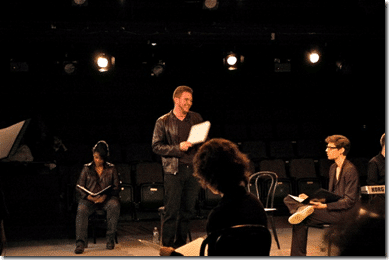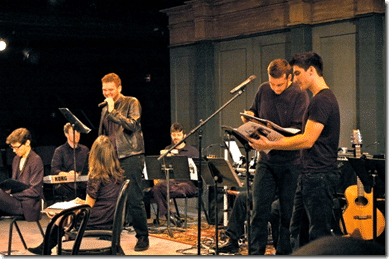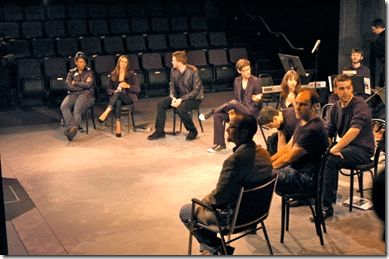Our reading of The Clowns took place last weekend, and after a week to digest all that happened, I thought I’d offer a few reflections:
1. Having never written a play before, the prospect of actual human beings performing my lines was both thrilling and terrifying. Thankfully, the Playhouse on Park managed to cast seven truly skilled and gifted actors who both brought the characters to life and belted out the music with remarkable precision after less than seven hours of actual rehearsal time.
I have performed musical theater on that stage in the past, but I am not an actor. Actors are highly skilled individuals with talent and expertise, and it was on display last weekend.
2. Of the seven primary characters in our rock opera, I thought only five belonged in the show. On several occasions over the past couple years, I made efforts to rid myself of my two least favorite characters by marginalizing their roles and generally ignoring them. Despite my attempts, the actors playing these parts brought them to life in a way that I could have never expected. By the end of the weekend, I came to realize that these two marginalized characters were two of the most important in the show. I would have never come to this realization had it not been for the actors performing the roles.
3. Prior to last weekend, I understood the music that my partner had written on only a cursory level. As I wrote the script, I dropped songs into place, reading their lyrics for meaning but never truly falling in love with any of the songs. Hearing them sung by the actors has changed everything, My understanding of the songs has moved beyond the lyrics and onto the song itself. I understand the emotionality of each song now. The feelings that the characters are experiencing while singing. I find myself singing songs from the show constantly, and I now have strong opinions about where songs would be better placed in the show, where lyrics might need to change and what songs deserve to be spotlighted.
4. One of the joys of watching the actors perform was discovering the unintended humor contained with the play. On two occasions the audience erupted in laughter that I had not planned. In both cases, I turned to my writing partner and said, “I didn’t write that line!”
“Yes, you did,” he said,
And he was right. The line existed on the page, but the humor contained within the line had been lost to me until the actor managed to bring it forth.
Nothing is better than a free laugh.
5. The show still needs a lot of work. The list of revisions that I have are endless, and by the time I am finished, I suspect that the show will bare little resemblance to what was performed last weekend.
That said, I think people enjoyed the performance a great deal.
6. After each performance, the audience was invited to share their opinions with us during a talk-back session and on comment cards. I was happy to see that audience members were willing to share and were not shy about criticizing specific elements of the show.
I’ve also received a great deal of criticism privately from friends, and all of it will help me a great deal. There are many, varied opinions on the show, and I think this is good. It’s a sign that the characters, the plot and the music engaged people.
7. Two specific struggles that I have in terms of revision are this:
- The rock opera is based upon an actual opera, and playing upon traditional operatic themes, I did not want to write a happy ending for any of the characters. In fact, the final line of spoken dialogue is “No happy endings” and this was intentional. While I like this stark realism, I realize now that I must also consider if an audience member wants to spend two hours in a theater and walk away feeling less than inspired. While a novel need not end happily in order to satisfy a reader, a play might, and I will need to reconcile this during revision.
I suspect that in place of a genuinely happy ending, I will be offering the audience some form of marginal optimism in hopes that this will be enough to satisfy them.
- Of the three female characters in the play, two were characterized by audience members as doormats, and in many ways, they are. While one of these characters ultimately takes control of her destiny and moves on in a relatively superficial way, the female lead ends the show where she began: willingly engaged in a relationship with an unfaithful boyfriend, with no hope or vision for the future.
Some of the most harsh criticism has centered on the hopeless, pathetic nature of these female characters, and the lead in particular. While I agree that the female characters were one-dimensional and (most egregious) unfunny, I am left wondering if I am required to write a female lead with greater likeability and ambition.
I have known women who hang onto the wrong guy for a long time, even in the face of mounting evidence that he is not right for them. Hell, I know women like this right now, and I suspect that in the music world, this dynamic occurs even more frequently.
This is the kind of woman I wanted to portray in the show. This is the woman whose motivation and purpose I wanted to explore.
But this may not be what the audience wants to explore with me.
It’s interesting to note that of the four male characters in the show, all are failures to one degree or another as well. None of the three musicians have any future in music. Three are womanizers (one downright lecherous) and the other spends most of his time playing online videogames with kids.
Hardly impressive. Yet not a word of criticism for their portrayal.
It’s also interesting to note that the only criticism of the female characters has come from women, and in speaking about this subject, some women have become downright angry about the portrayal. It’s as if the marginalization of my female characters was taken personally. While at least a couple men have commented on their one-dimensional nature, none have criticized the female characters for appearing pathetic, hopeless or unrealistic.
It makes me want to conduct a sociological experiment in which I write two versions of the same play. In one, the male lead will be hopeless and pathetic. In the other, the female lead will be the lame one.
Then we ask for feedback and see if there is a disparity of opinion based upon the version of the show and the sex of the audience member.
But that’s for another day.
I have revisions to work on.









